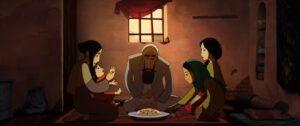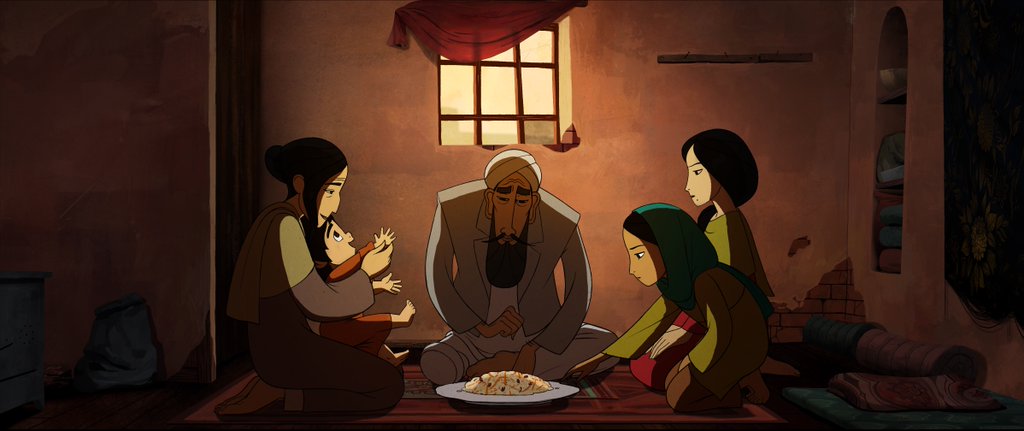Movie Info
Movie Info
- Director
- Nora Twomey
- Run Time
- 1 hour and 34 minutes
- Rating
- PG-13
VP Content Ratings
- Violence
- 3/10
- Language
- 1/10
- Sex & Nudity
- 1/10
- Star Rating
Relevant Quotes
I have seen the wicked oppressing,
and towering like a cedar of Lebanon.

Irish director Nora Twomey, who co-directed the exquisitely beautiful The Secret of Kells, launches out on her own with the gorgeously animated film set in Kabul in 2001 on the cusp of America’s invasion in retaliation for the attack on the Twin Towers. With its theme of the Taliban’s oppression of women, the film will remind some of another similarly themed film, though set in Iran, Persepolis. Actually, the story, adapted by screenwriter Anita Doron and novelist Deborah Ellis from the latter’s book is more like the live-actor film Osama in which a girl must dress like a boy if her male-deprived family is not to starve.
Parvana (voiced by Saara Chaudry) is an 11-year-old girl living in Kabul with her amputee father Nurullah (Ali Badshah), ailing mother Fattema (Laara Sadiq), older sister Soraya (Shaista Latif), and babbling young brother Zaki. Each day she sits with her father in the marketplace hoping to see the fancy dress she has never worn and numerous other small items. Once a schoolteacher, Nurullah offers to read or write anything a client needs to understand. He tells Parvana how their nation has withstood the occupation of numerous powers, from the invasions of Cyrus and Alexander to Genghis Khan and then the British and the Russians, but it had always survived,
One day he has a bad encounter with a group of Taliban, one of whom is a former student. Later the goons invade their home and carry him off to prison. Fattema and Parvana try to visit him in the distant prison, at the least hoping to pass on to him his crutch. Not only do the harsh guards refuse, but as the mother protests, they beat her severely. Soon the family face another formidable obstacle, the Taliban law that no woman can leave her house unless she is accompanied by a male. As a girl Parvana ought to be able to get around this, but the merchants are too afraid of the morality police to sell to her. She finds that even going out for water endangers her life.
When she decides to cut her hair and dress in the clothes of her dead brother Sulayman, she returns to the marketplace to try to sell her meager wares and to offer her literacy skills of reading and writing. She becomes friends with Shauzia (Soma Chhaya), also a girl passing as a boy. Together they pick up a few jobs and sell tea together. Shauzia, obliquely referring to an abusive home life, wants to escape to the seaside. The two plot how they might escape together and earn a living selling to the rich tourist who flock to the beach. At her friend’s suggestion, Paravena begins saving so she can bribe a prison guard to see her father. She also finds an ally in a former soldier named Razaq (Kawa Ada), who also has a tragic story. Meanwhile Fattema has been in touch with cousins in a distant city exploring the possibility of help from them—she offers her older daughter as a bride for their son. How this will become intertwined with Parvana’s trip to the prison to see her father just as American planes are bombing the city make for a suspenseful denouement. No, climax is probably better, because a lot is still left hanging at the end of the film, true to the situation still prevailing in that troubled land where the Taliban, though not in control, still is a major threat to its women.
Scattered throughout the girl’s comings and goings is the story Paravena tells to her little brother Zaki in which the young hero is her dead brother Sulayman (Noorin Gulamgaus). When the powerful Elephant King steals all of the seed needed for next year’s crops, the boy sets forth on a quest to regain them. It involves an old woman who tells him he needs three things to prevail, and along the way, he acquires them, even though he is always being pursued by some evil monsters. We also learn, from Sulayman that his death was related to the past war that had also brought tragedy to Razaq. And now another war is beginning!
It was Parvana’s father who has inspired his daughter, he once telling her, “Stories remain in our hearts even when all else is gone.” “All else” is indeed gone for this hapless family, but thanks to Parvena’s imagination, hope is sustained, for herself as well as her family. The film shows well how imagination is necessary to sustain hope. People of faith watching this film might think of Isaiah whose God-inspired imagination conjured up during a time of war the following poetic picture:
The wolf shall live with the lamb,
the leopard shall lie down with the kid,
the calf and the lion and the fatling together,
and a little child shall lead them.
The cow and the bear shall graze,
their young shall lie down together;
and the lion shall eat straw like the ox.
The nursing child shall play over the hole of the asp,
and the weaned child shall put its hand on the adder’s den.
They will not hurt or destroy
on all my holy mountain;
for the earth will be full of the knowledge of the Lord
as the waters cover the sea.
Isaiah 11:6-9
The detailed hand-drawn animation is replaced by colorful paper-cut animation in the story segments, making a delightful contrast. Although the story is too dark and complex for preschoolers through elementary school age children, I think middle school students will take to this story of a brave little girl who becomes the bread winner for her family. She is much braver and more willing than the girl in Osma, though I still recommend this one for adults wanting to understand the dangers facing women in the beleaguered Afghanistan. It is their plight that complicates what might otherwise be a simple decision for our government to withdraw all of its troops from that troubled country. It is fitting that it is a group of women—from novelist Deborah Ellis to screenwriter Anita Doron to director Nora Twomey—who have brought this story of women in peril to world attention. They affirm what the psalmist wrote, “I have seen the wicked oppressing, and towering like a cedar of Lebanon.” This film is their plea to the world to take heed.
This review will be in the December issue of VP along with a set of questions for reflection and/or discussion. If you have found reviews on this site helpful, please consider purchasing a subscription or individual issue in The Store.

